Chapter VI: Freezing to Death in the Canadian Rockies
of Travels with Samantha by Philip Greenspun
Saturday, June 19 (continued)
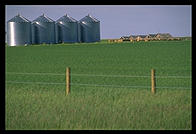 "Do you have any guns?" asked the officer at the Canadian border and
then I was into Alberta. Some of Montana's friendliness evaporated as
every gas station sprouted an enormous "washrooms for customer use only"
sign. The landscape was completely flat, but I'd seen so much of the
Rockies that being able to set the cruise control on 60 and relax was a
relief.
"Do you have any guns?" asked the officer at the Canadian border and
then I was into Alberta. Some of Montana's friendliness evaporated as
every gas station sprouted an enormous "washrooms for customer use only"
sign. The landscape was completely flat, but I'd seen so much of the
Rockies that being able to set the cruise control on 60 and relax was a
relief.
Approaching Calgary from the vast emptiness of Alberta, one enters
into the kind of capitalist cornucopia that Americans so badly wanted
to show the average Russian back in the Cold War days. One mall after
another hits the traveler with a relentless intensity, and some of the
stores are overgrown to an absurd degree--supermarkets are four times
the size of Boston's largest, for example.
It was rather hard to even see the city at first, so obscured was it by
an enormous cloud of pollen whipped up by the wind. Closer up it
reminded me of Minneapolis: big glass skyscrapers climbing from nowhere
and rapid reversion to flatness. There is one unmistakably Canadian
feature, however, a tall cylindrical tower with radio antennae and a
tourist restaurant. It must say something about Canadian psychology
that they've built special round towers in Montreal, Toronto, Calgary,
and Vancouver when most U.S. cities manage nicely with ordinary square
office buildings. What would Freud have said?
Calgary's youth hostel was full of the usual Germans and Australians,
plus a few surprises. Hauling out Samantha earned me the company of a
couple of delightful Japanese girls, Keiko and Kazuyo. My position on
the couch later earned me the company of Judy and John, an unlikely pair
of Northern Irish and plain-old-Irish. Having spent a whole life
reading newspaper accounts of troubles between the English and Irish
without having actually visited Ireland, I was surprised to see them so
friendly with each other and even the English travelers.
"Is Judy Protestant or Catholic?" I asked John.
"I've never asked," he replied. "The fights that you read about in the
newspaper are carried on by poor uneducated scum. It isn't relevant to
our lives."
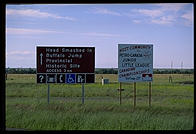
Late in the evening, I chatted with Yvonne, who had prepared for her
trip in the best British tradition. I
told her that I'd been confused by a highway sign an hour south of
Calgary: "Head-Smashed-In Buffalo
Jump."
"Oh. I read all about that back in London. There are two cliffs over
which Indians used to drive bison. One Indian would play a dead calf
and one would play a live calf and blend in with the herd. At some
point, they'd both jump up and start shouting, and the confused buffalo
would just jump off the cliff. The place gets its name from a warrior
who wanted to see the jump from the bottom and, predictably, got his
head smashed in by the 500 falling buffalo."
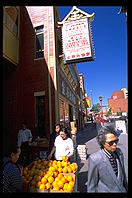 Sunday, June 20
Sunday, June 20
I biked about 20 miles around Calgary today. My first stop was the
modern and scrubbed Chinatown. The people looked an odd combination
between corn-fed Iowan and typical slim Chinese. They were definitely
thicker than your average Chinese-American. I took some dim sum to
Prince's Island Park and ate on the grass before heading out to bike up
the Bow River.
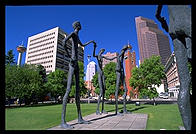 Calgary is a knot of slick modern urbanity that disintegrates after just
a few blocks. One is abruptly swept from soaring 30-story glass tower
to one-story auto repair shop. Riding back through a nasty 20 mph
headwind, I stopped at the downtown interconnected multistory shopping
mall complex (is there any Canadian downtown that lacks one?) and bought
a few trinkets. I finished my tour in Kensington, Calgary's equivalent
of Greenwich Village. It lacks only sizable bookstores or really
pleasant cafes to be a contender. In fact, many parts of it look rather
like suburban U.S. strip malls.
Calgary is a knot of slick modern urbanity that disintegrates after just
a few blocks. One is abruptly swept from soaring 30-story glass tower
to one-story auto repair shop. Riding back through a nasty 20 mph
headwind, I stopped at the downtown interconnected multistory shopping
mall complex (is there any Canadian downtown that lacks one?) and bought
a few trinkets. I finished my tour in Kensington, Calgary's equivalent
of Greenwich Village. It lacks only sizable bookstores or really
pleasant cafes to be a contender. In fact, many parts of it look rather
like suburban U.S. strip malls.
It is a beautiful hour's drive from Calgary, the shopping mall amidst
the plains, to Banff, where the young, beautiful, rich, and Japanese
shop till they drop. One approaches the Rockies first indistinctly and
then before one realizes it, one is in a river valley with mountains all
around. I arrived in Banff around 7:00 PM and, with plenty of daylight
in front of me, headed straight down a mountain on my bike. The trail
was terrifyingly steep, especially for a man surgically attached to his
bike with Shimano SPD pedals, into which one clips special cleated shoes similar
to how one uses ski-boot bindings. The river flats were populated with beavers,
take-no-prisoners mosquitoes, elk, and pleasant Swiss-Germans. One of
the first differences between the U.S. and Canada is that elk here are
regarded as a major hazard. In Yellowstone, one is presented with
dramatic imagery of bison launching tourists into orbit with their
horns, but elk are painted as being fairly benign. Here the park
service has gone so far as to close certain trails because during
calving season the elk are allegedly out for blood.
Monday, June 21
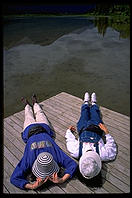
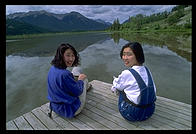 I met Keiko and Kazuyo again and gave them a ride down to the
mirror-flat Vermillion Lakes. Just five minutes from the town's
shopping malls, we saw elk, a diving osprey catch a fish and lose it,
and a bald eagle calmly perched in a tree. As we drove up the main
highway toward Lake Louise, it occurred to me how very sharp the peaks
are here, in many ways more dramatic than most of the American Rockies
or the Sierras. A lot of mountain enthusiasts prefer the look of the
landscape here, although rock climbers don't appreciate the unsafe
sedimentary rock.
I met Keiko and Kazuyo again and gave them a ride down to the
mirror-flat Vermillion Lakes. Just five minutes from the town's
shopping malls, we saw elk, a diving osprey catch a fish and lose it,
and a bald eagle calmly perched in a tree. As we drove up the main
highway toward Lake Louise, it occurred to me how very sharp the peaks
are here, in many ways more dramatic than most of the American Rockies
or the Sierras. A lot of mountain enthusiasts prefer the look of the
landscape here, although rock climbers don't appreciate the unsafe
sedimentary rock.
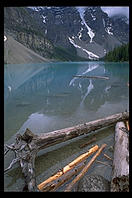 As we wound our way up the mountain to Moraine Lake, I recalled a German encyclopedia's first photograph under the entry for the United States: "USA. Morain Lake im Banff National Park in den Rocky Mountains."
Wherever you stand on the controversy of which country owns the lake, it
glows with an eerie turquoise light, reminiscent of Poe's poem The
City in the Sea. This glow persists even on a gray day like today
and is caused by light bouncing off fine rock dust in the water. The
dust is scraped off mountainsides by the glaciers that feed the lake.
As we wound our way up the mountain to Moraine Lake, I recalled a German encyclopedia's first photograph under the entry for the United States: "USA. Morain Lake im Banff National Park in den Rocky Mountains."
Wherever you stand on the controversy of which country owns the lake, it
glows with an eerie turquoise light, reminiscent of Poe's poem The
City in the Sea. This glow persists even on a gray day like today
and is caused by light bouncing off fine rock dust in the water. The
dust is scraped off mountainsides by the glaciers that feed the lake.
On the lakeside path, we talked with aristocratic Mexicans who said
they'd traveled a lot in both Canada and the U.S. and were treated
better in Canada. Keiko thought the 35-year-old graying man and
20-year-old woman were father and daughter, but in fact they turned out
to be boyfriend and girlfriend--apparently there's hope for all of us
overaged bachelors south of the border.
We drove through a hard rain to Lake Louise and soon came upon the
magnificent Chateau Lake Louise, built in stages starting 100 years ago
by the Canadian Pacific Railroad. Like everything else in the deluxe
tourist trade here, it now caters mainly to the Japanese. I had a nice
chat in the chocolate shop with Brian, a ski/mountain bike bum who'd
come here for the bohemian life seven years ago and had grown by
imperceptible steps into a petit bourgeois merchant. I bought a
couple of Lindt liqueur chocolate bars, but they later proved to be
emasculated alcohol-free versions of the slices of Heaven one gets in
Switzerland.
Lake Louise itself is a green jewel backed by a glacier-covered mountain,
and we had a nice walk around the shore before moving on to a riverside
campground. We pitched the tent and ate a picnic while killing enormous
mosquitoes whose heavyweight carcasses presented a disposal problem once
they'd been crushed. Towards the end of a pleasant after-dinner stroll
in the fading 10:45 PM light, I stopped to talk to a couple of scruffy
hitchhiking guys. Keiko and Kazuyo looked a bit scared and retreated
50 yards or so down the road. They said they'd avoided taking a
package tour because they wanted to drink in the local culture during
their 10 days in Canada. I wondered how they could do that if they
were afraid of the local people.
I stripped naked and crawled into my sleeping bag while my companions
were in the bathroom. When they returned, Keiko wryly noted that I was
"shirtless."
"Only animals sleep in their clothes," I responded.
Keiko and Kazuyo got into their sleeping bags fully clothed.
June 22
Even after 24 hours together I never felt that I achieved any real
understanding of Keiko and Kazuyo's motivations or aspirations. Their
English was pretty good and they were about my age, yet a huge gulf
yawned between us. What did they hope to accomplish in their lives?
Where did they want to be in five years? What was fundamentally
important to them? I couldn't have begun to say.
After shaking off the cold and damp of the campground, K, K, and I
shared a breakfast table in the youth hostel cafe with the radiant blond
blue-eyed Thomas, a Dane at the end of an 11-month round-the-world
odyssey. Despite the 50-degree drear, Thomas was all set to rent a
mountain bike and hit the hardest trails in the area. I was still
trying to read Main Street, having acquired it at the Sinclair
Lewis home in Minnesota, I was exactly three states and one province
behind in my reading. I would have been happy to sit out the day
reading, but Thomas shamed me into activity. Leaving the Japanese girls
to make their way north to Jasper, we donned our cycling gear and
sallied forth. I wore a Gore-Tex jacket over a cycling jersey, cycling
pants, Lycra leg warmers, and SPD shoes. Thomas wore longish Eurostyle
drawstring pants, a sweatshirt, a plastic jacket, and loafers (!). I
lent him some extra biking gloves and a fanny pack for his camera.
Thomas and I started up the trail, he with the natural vitality of
youth, me with seasoned wisdom, some biking conditioning, and technique.
I got up all the hills, albeit not without some bitching and moaning as
we climbed 600' in a raw wind. My ears hurt from the 50-degree cold and
the 20 mph headwind and I lost sensation in my exposed fingers after
just 30 minutes. Thomas had no such complaints, but he was standing up
in the saddle and trying to overpower the slippery slopes. By applying
power in bursts, he just threw gravel all over the place and didn't move
his bike forward. I spun my cranks smoothly, swiftly, and relentlessly,
staying on the saddle, and didn't have to suffer the indignity of
walking.
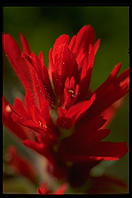 While gazing at the quiet forest and occasional river valley vistas and
ducking hailstones, we shared some interesting conversation. Thomas is
19 and just finished the Danish equivalent of German Realschule (a kind
of high school that is a more practical alternative to gymnasium). He's
going to do military service, one of an unlucky 25% or so who lost a
lottery, and then go on to university (still free) in Denmark.
While gazing at the quiet forest and occasional river valley vistas and
ducking hailstones, we shared some interesting conversation. Thomas is
19 and just finished the Danish equivalent of German Realschule (a kind
of high school that is a more practical alternative to gymnasium). He's
going to do military service, one of an unlucky 25% or so who lost a
lottery, and then go on to university (still free) in Denmark.
A few months before, I'd met a Czech émigré architect in
Prague who was just returning after eight years in Denmark. He'd
described the Danes as unwilling to accept immigrants in their social
lives or even in the first rank of jobs.
"Your friend is right. Danes aren't accepting at all, especially of
Turks who stubbornly cling to Islam. After one or two generations they
should convert to Christianity. That's the religion of their new home,"
replied Thomas, who added that he himself was not a religious
believer.
"There aren't even many Danes who feel genuine sympathy for the Turks
being killed by neo-Nazis in Germany. We don't like the idea of Germany
invading Denmark again, but most Danes think it understandable that
Germans are irritated by an alien presence in their midst. I've got
some Turkish friends and am probably more open-minded than the average
Dane."
I'd never before realized how unusual the U.S. and Canada are in not
having an official religion.
Lake Louise is probably the world's nicest youth hostel, and the lounge
is superplush. Relaxed after the ride, I chatted with Ralph, a
schoolteacher from Prince George, B.C. Ralph teaches correspondence
school for 40 fourth through seventh graders. Some live in the middle of Nowhere,
B.C., but quite a few live in reasonable-size towns and have simply
exercised their option to learn at home.
"Disciplined students need about three hours/day to get through the
standard curriculum. They send me papers by mail. I used to teach in a
traditional public school, and correspondence school is better when a
child has reasonable parents."
Ralph was playing Risk with his German cousins, and I was struck by how
different Canadian and German culture are. Despite similar genes, not
only their mannerisms but even the way they hold their faces was
completely different. Ralph looks rather contemplative, questioning, and
studious, his cousins stolid and self-satisfied.
I would never have guessed that they were related.
Thomas and I had planned an afternoon ride, up 1200' to Lake Moraine. I
felt rested, but the 30 mph wind driving a cold rain made me think twice
about riding up an exposed ridge. Thomas saved me from having to wimp
out: "I'm dead tired from this morning's ride. I can't go."
I spent the rest of the day exploring the various commercial offerings
of Lake Louise, letting Thomas cook me a pasta dinner, and chatting with
folks in the hostel lounge. One doesn't meet too many bona fide English
émigrés in the U.S. anymore, and therefore it was
interesting to speak with Jean, a 61-year-old woman born in Liverpool.
At age 19 she'd refused to marry a nice Jewish guy of 31, not because of
his ethnicity but because he was too old. She has spent the rest of her
life regretting this decision, for the English army officer that she did
marry proved to have an upper lip that was just a bit too
stiff.
"My sister was a war bride living in Vancouver, and she convinced me to
come over with my 6-year-old son Malcolm. I had to leave an older
daughter in England with my husband. He was so angry with me for
emigrating that he cut me and Malcolm off entirely."
Was her sister able to support her?
"Oh, we started to fight after three months so I moved to my own
apartment and got a job as a secretary. Malcolm was a precocious chap.
When he was only 7, he gave a dramatic lecture on Rommel's North
African campaign during show-and-tell. The teacher called me up to say
that he'd inspired her to undertake her own study of WWII desert
combat."
At the age of 40, Jean married a man in the construction business, and
they quickly had a daughter, Alisa. Her husband worked himself into an
early grave, and Jean and Alisa were left on their own once again. They
aren't close for a variety of reasons, one of which is that her mother
can't abide Alisa's academic lassitude.
"Alisa is very beautiful. That's the basic problem. Why should a girl
study if men are sending her flowers all the time? Now Alisa's fat
charmless friend Dawn... there's a great student."
Ralph and I talked until 1:30 AM. Ralph told me about the year he took
off from U.B.C. to study at a fundamentalist bible college in
California. Education had been poisonous to his faith as he failed to
reconcile the idea that the New Testament was divinely inspired with the
dramatic inconsistencies in the accounts by different apostles. A
deeper feeling that the Jewish/Christian god might not be such a great
one had been inspired by his reflection upon all the violence that had
been allegedly authorized by this god. Ralph went all the way back to
God's instructions to the Jews to wipe out the Canaanites after the
Exodus from Egypt. Moving forward, he looked at all of the wars
allegedly authorized by God, e.g., against the Muslims, the Jews, various
heretical sects and pagans, etc. A god that was right at home in the
violent ancient world looked a little out of place in the modern love-in
of British Columbia.
Ralph switched gears and ran down the Israelis for their intolerance in
refusing to give citizenship to Jews for Jesus.
"You expect better of them because of your implicit assumption that
Israel is somehow controlled by people like yourself, i.e., with good
English middle-class values. Remember that a good chunk of the
population stems from the 500,000 Jews kicked out of Arab countries
after Israel won the 1948 war. They came from the bottom strata of poor
Arab societies such as Iraq and Morocco and spoke no European languages and
hardly even any Hebrew. They might be Jews in name, but they were Arabs
in culture. How tolerant do you expect Saddam Hussein or any other product
of Arab culture to be?"
"Well, not very," Ralph admitted.
"Since a large proportion of Israeli voters are either bona fide Arabs
or Jews from Arab countries, you should in fact be surprised that Israel
is any more tolerant than Iraq," I said. "Bruce and I took a cruise
down the Nile with two German sisters. Rita said, `Why don't these
stupid people learn how to serve soup? Every day they spill the soup in
the same way, even though we actually went over once and showed them the
proper way to do it.' I said, `Rita-baby, look around at the people
carrying sugarcane on donkeys. Does this look like Germany? If
everyone here tried to find a better way to do his job, Egypt would be
as developed as Germany.' Even when evidence to the contrary is staring
them in the face, people have a hard time shaking the assumption that
everyone else thinks as they do."
One of the things about Ralph that surprised me the most was his
sentiment against Asian immigrants: "Canada shouldn't admit Cambodians
and Vietnamese because they haven't the language or job skills required
to succeed here. They've no choice but to turn to violence and
gangs."
"That's one nice thing about the U.S.," I responded. "We may be dependent
upon Asians to engineer our cars and produce our consumer electronics,
but we are able to home-grow most of our criminals."
We parted on the subject of women. Ralph is 39 and in conflict. "I'm
drawn to Christian women and simultaneously repelled by their
anti-intellectualism and inability to think."
June 23
Back in the town of Banff I was struck by the preponderance of Japanese.
In America, our reputation for violence keeps scenic areas from becoming
Japanese colonies. Another thing that draws Japanese to the Canadian
national parks is their policy of limited laissez-faire rather than
monopoly. For example, a wealthy Japanese tourist on a rainy day in
Banff National Park is able to visit a Polo shop and dozens of similar
enterprises; in Yellowstone he or she would be sitting in a 100-year-old
lodge lobby listening to Stephen Foster songs. It struck me that there
is really no part of the U.S. where one feels a stranger in one's own
land. Chinatown is exotic, but most of the customers in a restaurant are
Chinese-Americans rather than tourists from China. Even in places that
have no industry other than tourism, there are just too many
intra-U.S. tourists for foreigners to ever constitute a majority.
A government worker expressed the prevailing local sentiment: "It is
eerie going into a shop where the salespeople don't speak English.
There's good sport to be had imitating the more ridiculous Japanese and
Germans, but I prefer to live 20 miles from here in a little village
that is `more Canadian.'"
At 7:00 I ducked into Jurassic Park at the town's quad movie
theater. I'd spent a good part of the day fighting with America OnLine.
They were acting in the best tradition of Corporate America: deny
everything; obfuscate; treat the consumer with bland indifference--we
have lawyers and he doesn't. Nonetheless, I had finally proved that the
problem lay with their system, the shining product of hundreds of
millions of dollars of investment and the latest crop of 22-year-old C
hackers. Just as I was trying to think of a way to save America's
children from turning into the kind of pathetic drones who write C code
for companies such as America OnLine and Microsoft, Steven Spielberg
came to my rescue.
Spielberg paints the definitive portrait of the early 90s industrial computer
programmer: fat, bitter, underpaid, and unsatisfied. His job security
comes from a nasty collection of 2 million lines of C code that nobody
will ever understand or get to work properly. He won't get the steaming
pile of offal to function correctly, but by continuous intervention he
can keep his employer living in hope and forking out $50,000/year.
June 24
I hit the road intending to go straight towards Jasper, but quickly
picked up a hitchhiker who convinced me to explore adjacent Yoho
National Park first. Takakkaw Falls, though puny by Yosemite standards
at a mere 1000', is one of Canada's highest and most easily accessible.
On the way there, I got a great view of the back half of a train going
into a mountainside and the front half coming out going the opposite
direction. This spiral railway tunnel is part of Canada's
coast-to-coast rail link.
Lunching in Field, where the tourism industry is confined to the
postcard rack at the general store/cafe, I met Steve, a long-haired lean
outdoorsman. Steve came here in 1970 from California and stayed to make
his living skiing. Not for Steve the life of saying "bend ze knees,
five dollars pleez" to the coltish daughters of the elite. This loner
prefers mountain solitude and makes his living climbing up into the high
passes on special skis in the winter, looking for potential avalanches.
When Nature threatens highway or railroad, she is given a little push by
a 105 mm howitzer antipersonnel round. Several thousand of these $600
babies are often expended in a season around Banff/Jasper.
Steve will be 50 soon and has some slight regrets about being left
out of the materialism party, but he feels younger and more vital every
day thanks to eating strange ancient Chinese herbal foods and absorbing
the philosophy of Depak Chopra. Ironically enough, Chopra is an
endocrinologist who used to work at New England Memorial Hospital, about
one mile from my house in Melrose, Massachusetts. We listened to one of
Chopra's lectures integrating psychological and immunological research,
insights from the trances of ancient Vedic seers, and the Maharishi's
Grand Unified Theory.
Chopra goes back to the Hubel and Weisel experiment exposing kittens
to only horizontal or vertical lines; they ended up able to see only the
kinds of lines they'd been exposed to. We function with a neural system
that functions only to reinforce what we were exposed to in the first
place ("premature cognitive commitment"). We commit ourselves to a
certain reality, and then literally our nervous system serves to
reinforce conceptual boundaries we've established whether or not the world
really looks that way. Without acknowledging Bishop Berkeley, he offers
many of the same criticisms of the "superstition of materialism," i.e.,
that since all we have available to us are sensory experiences we can't
know what the world is really like. Chopra claims that technological
developments will overthrow the superstition, although he doesn't say
how.
Chopra claims that there are receptors to neurotransmitters not only in
the brain but also in cells throughout the body. "T-cells, lymphocytes,
etc. eavesdrop on what we are thinking!" Also these cells make the same
chemicals as the brain when it thinks. It is tough to tell the
difference between the immune system and nervous system. Even stomach
cells have this property of sensitivity to and production of brain
chemicals. "So people who talk about a `gut feeling' or `heart ache'
are in fact speaking literally. It is wrong to confine the mind to the
brain."
Chopra cites a recent study that concluded that the two most important risk
factors for death from coronary artery disease are self-happiness rating
and job satisfaction. More people die of heart disease at 9:00 AM on
Monday than at any other time. Chopra cites a study using medical
students during exam periods that found stress depresses Interleukin-2
levels and even DNA cell activity. If you feel exhilarated,
Interleukin-2 levels go up. Since one anticancer treatment with this
drug costs $40,000, a ride on a roller coaster can produce millions of
dollars of Interleukin-2.
Space and time themselves are artifacts of sensory experience. In
India, there were tribes where people just got to be better athletes
with age, doing better at 30, 50, 60! Guys plateaued rather than
deteriorated. Blood pressure got lower and heart rate slower. Lungs
became higher capacity. (At this point I became rather skeptical; all
the older Indians I'd seen in photographs looked to be in pretty sorry
condition.)
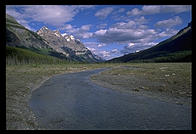
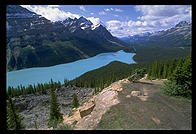
It was nearly 4:00 pm by the time I extricated myself from Steve's
hospitality and Chopra's lilting exhortation to drift off into a
"field of information." With six hours of daylight ahead, I
poked my way up the fantastic Icefields Parkway, stopping every now
and then for a little hike, a turquoise lake, a look at the jagged
peaks, and once to watch a good-size black bear and her two cubs mosey
through the woods.
My most interesting roadside conversation was with another Philip. He
works for the Canadian parliament's foreign affairs committee and
observed that a principal difference between Americans and Canadians is
that racist Americans will openly admit their prejudices whereas racist
Canadians will try to disguise themselves.
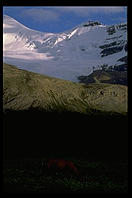 "Well, at least you guys made a real contribution to the
politically correct lexicon. I saw a newspaper article referring to
immigrants as `New Canadians.' It made me think that somebody regards
anti-immigrant sentiment as a serious problem." I noted.
"Well, at least you guys made a real contribution to the
politically correct lexicon. I saw a newspaper article referring to
immigrants as `New Canadians.' It made me think that somebody regards
anti-immigrant sentiment as a serious problem." I noted.
"We let in proportionately far more immigrants than the U.S. I think
that explains some of the animosity. We also have a lot of social
disruption right now. The Atlantic provinces [New Brunswick,
Newfoundland, Nova Scotia, PEI] are going to empty out because there
just aren't any jobs. Russians and Portuguese routinely defy the
200-mile limit and have depleted the fish stocks so much that the
Canadian government imposed a ban on all fishing. It destroyed a
whole way of life."
I spent the night at the Columbia Icefield Pass, where I chatted with a
bunch of Canadian environmentalist painters. Pam, who's lived all
around North America, is upset that Canada lags the U.S. in terms of
environmentalism. "People still have the attitude that the country is
big enough that they can use up part of it and move on. What upsets
me the most is that we sell huge forests to the Japanese and then
they clear-cut them."
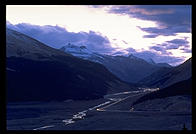
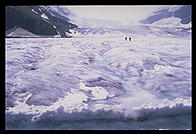
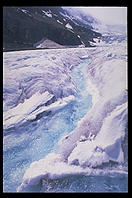
Friday, June 25
Occasional patches of blue poked through the low clouds, and a raw wind
made me happy to be inside a "Snocoach" on the
Athabasca Glacier, just
one of the rivers of ice that flow out of the enormous "lake of ice"
that is the Columbia Icefield. One rides in a $480,000 vehicle with
six 6'-diameter tires over the four-mile-long, half-mile-wide,
100'-thick glacier, which is surrounded by 11,000' peaks with their
own little glaciers. We got out of the Snocoach for 20 minutes at the
top of the glacier but were cautioned not to walk too far due to the
large crevasses.
Next stop was the viciously overpriced cafe at Sunwapta Falls.
Laissez-faire within Canada's parks leads to great values where there is
competition and shameless ripoffs where there isn't. Leif and Darryl,
two 26-year-olds, proved that one need not be from California or have
gone to college in order to be "rotated 45 degrees into the complex
plane." Despite their prosaic highway department day jobs, they were so
New Age that Los Angeles seems positively Old World by comparison. It is
not important to work for success; the important thing is to get it.
One gets what one wants by having a pure true desire. Any failure is
explained after the fact by the statement, "He didn't really want it."
"So the Tacoma Narrows Bridge blew down because its engineers didn't
have a pure desire to see it stand? And the George Washington Bridge
remains because its engineers did have a pure desire?" I asked.
"Now you are getting it," Darryl encouraged me.
Luck has nothing to do with anything. I couldn't poke holes in their
theory with any of my questions. Bill Gates is rich because he had a
purer desire than the other folks hawking 1950s-style operating systems
back in 1982, not because he was lucky enough to be picked by IBM.
Poland suffered not because it was unlucky in being in between Russia
and Germany but because people there all have subconsciously chosen to
be oppressed.
"Most of the Poles are probably there because they made some bad choices
in a previous life," Leif noted. "You can't escape Karma."
Modern medicine is a complete fraud. People make themselves sick by
suppressing anger and can heal even advanced cancer by thinking
appropriate thoughts. Psychic healers can pass their hands over your
ruptured appendix and bad stuff is magically replaced by good stuff.
Sinclair Lewis showed that broad prairies don't breed broad minds, but after
all of these New Age conversations I was beginning to think that high
mountains breed high, i.e., "stoned" minds.
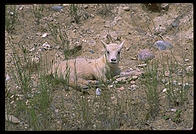
Feeling a little stoned myself, I drove north toward Jasper, stopping to
look at waterfalls, a herd of mountain goats with two tiny lambs, and a
large grizzly bear. Mr. Grizzly was impassively surveying the highway
from the edge of the woods (maybe 75' back from the road), perhaps
thinking about crossing. The five or six cars that quickly gathered to
gape presumably changed his mind, and he just turned around back into the
woods.
Jasper itself is less a Japanese colony than Banff and more a
traditional center of mountain hedonism. The public swimming center
here not only has a fine workout pool, but also a great Jacuzzi and a
huge waterslide! I swam one kilometer and then rested my bones in the
Jacuzzi with two guys from Frankfurt. If I'd thought Germans who tour
the U.S. parks in their hermetically sealed motor homes had little
affinity for American culture, that was because I hadn't met those
visiting Canada. These two are spending five weeks in Canada, but are
scrupulously avoiding the U.S. because, as they cheerfully averred,
Americans are all slobs.
I spent the rest of the evening reading Main Street (432 pages)
and writing a few postcards for the Internet-challenged. Canadian
stamps are a bit larger than their U.S. counterparts, graphically more
complex, bilingual, and in relatively understated colors. One might
infer that Canadians are used to more space, are attuned to subtler
distinctions, and are more understated. Unfortunately, they also appear
to be inefficient as postage is 50-100% more than in the U.S. and
Canadian stamp packaging is much more wasteful. One wouldn't think it
possible, but Canadians actually have a lower opinion of their post
office than we do. They complain that the workers are unionized and
absurdly overpaid, that mail is delivered at a glacial pace, and that
much mail is actually lost.
I encouraged them to look on the bright side: "You hardly ever have a
post office shooting spree here."
Saturday, June 26
The morning broke clear and blue-skied, and I rode up the Whistler
Mountain gondola to a fabulous view. I walked around a bit up there and
finished Main Street. There was a 15-minute wait to get back
down on the gondola, and I chatted with a family from Arkansas. I told
them how surprised I was at the number of New Agers in the Canadian
Rockies.
"Too many people call themselves New Age who haven't adequately
studied. I've been looking at it for two years; there's a lot of truth
to it," responded the husband, a churchgoer and video rental mogul.
What about Bill and Hillary?
"Just wait until the end of his term; the public will love Hillary
then," he gushed. "The only people in Arkansas who haven't met Clinton
are those that didn't want to."
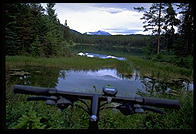
Later in the day, I biked out to the Valley of the Five Lakes, taking
advantage of the Canadian national park system's liberal attitude
toward mountain biking.
"Only three mountain bikers in Jasper can get up all of the hills on that trail," cautioned the Lycra-clad animal in the bike shop.
Just as I was thinking that the ride wasn't nearly as tough as
advertised, the Mother of All Hills appeared out of nowhere. It was
probably 70' high and rose at a 20-degree angle; rocks and roots made it
especially gnarly. I snapped out of my SPDs about one quarter of the
way up and huffed up the rest. After about two miles I came down a hill,
and a group of four young hikers jumped two feet into the air.
"We thought you were a bear! We saw two bears half an hour ago."
I climbed up about 600' with frequent small depressions through fairly
closed-in woods before coming to the first of the five lakes. A very
impressive little sign with distances to various lakes and the highway
convinced me that I couldn't get lost on this trip. Each lake was a
dark green little treasure, and the ridge trail afforded views over each
lake to the big mountains around Jasper. I'd kind of lost count
unfortunately and continued along the shore of the fifth lake when I
should have turned. The trail became an obstacle course of huge logs,
rocks out the wazoo, and eventually impossibly steep slopes filled with
trees. I backtracked and fought my way out the usual route, which was
no picnic either.
I finished the 16-mile ride past swimming beavers and grazing elk.
Sunday, June 27
Under drizzly skies I packed the soaking wet tent and went over to
HavaJava for breakfast. The front page of the Edmonton Sunday paper
carried two stories most prominently, one on securing a child seat in an
automobile, one on a recent U.S. missile attack on Iraqi intelligence
headquarters. The 20-year-old tragically hip U.B.C. student behind the
counter was upset about how the poor Iraqi-in-the-street would see this
attack.
"Why didn't the U.S. ask permission from the U.N. before doing this?"
she asked.
Perhaps because of the U.N. committee that has spent the last 25 years
trying to define "aggression"?
"Americans are so much more aggressive than Canadians. I don't know
any Canadians who think violence is justified, and I've hardly met any
Americans who are as progressive," she observed.
"If 99% of the Americans you've met are traveling in motor homes, I'm not
surprised," I responded. "You should visit the People's Republics of
either Berkeley or Cambridge if you want to find kindred spirits."
"I'm studying political science, and I keep coming back to one question:
Why are there still people in the world building the atomic bomb?"
I don't think she'll be able to use my response in her bachelor's
thesis: "Perhaps it was because the last people to use it won a war?"
After a brief rainy hike through Maligne Canyon,
I had a long soak in Miette Hot Springs. I chatted there with a couple
from nearby Edson. He works processing sulfur beads for industry and
voiced very similar political views to what I'd heard across the U.S.
In particular, he feels more like an inhabitant than a citizen.
"All the political power is in Ontario and Quebec. It doesn't make any
difference for whom one votes. We've not had a real choice for 20
years; both parties are the same."
 Chapter VII: Edmonton to the AlCan
Chapter VII: Edmonton to the AlCan
 Table of Contents
Table of Contents
philg@mit.edu
Related Links
Add a comment | Add a link
 "Do you have any guns?" asked the officer at the Canadian border and
then I was into Alberta. Some of Montana's friendliness evaporated as
every gas station sprouted an enormous "washrooms for customer use only"
sign. The landscape was completely flat, but I'd seen so much of the
Rockies that being able to set the cruise control on 60 and relax was a
relief.
"Do you have any guns?" asked the officer at the Canadian border and
then I was into Alberta. Some of Montana's friendliness evaporated as
every gas station sprouted an enormous "washrooms for customer use only"
sign. The landscape was completely flat, but I'd seen so much of the
Rockies that being able to set the cruise control on 60 and relax was a
relief.














